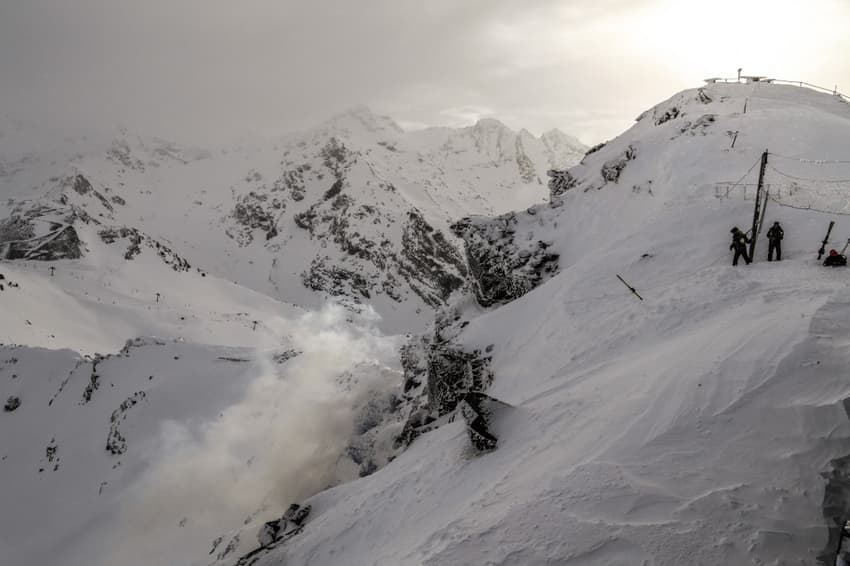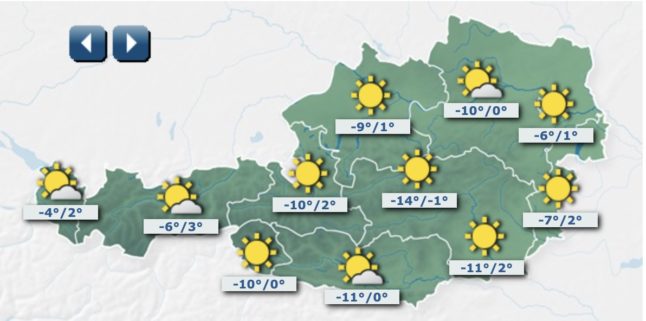Today in Austria: A roundup of the latest news on Tuesday

Austrian government considering rental cap, Tyrol lags in childcare, avalanche risks and more news from Austria on Tuesday.
- Austrian government considering rental cap
The centre-left SPÖ and the far-right FPÖ have been calling for a stop to rent increases for some time. Now, the governing parties ÖVP and Grüne are also said to be interested in a change in the law with a possible rent cap, broadcaster Austrian media reported.
"We are currently in parliamentary coordination," said Nina Tomaselli, member of the National Council and spokeswoman for the Greens on housing and construction, in an interview with APA. The Austrian People's Party (ÖVP) is also sending out signals that a solution to rent increases could be agreed upon, the report added.
One of the possibilities discussed is a cap on the inflation compensation, so rental costs wouldn't increase by so much even when inflation rises above a certain level.
READ ALSO: Cost of living: Why are rents in Austria rising so steeply?
- Avalanches in Austria: What you should know to stay safe in the mountains
Austria is an excellent destination for skiing, snowboarding and other winter sports, but the risk of deadly avalanches is real. Here's what you need to know to stay safe in the Alps.
- Tyrol lags behind in childcare
With an average of 38 closed days per year, Tyrol has the highest number of "days off" in kindergartens, and many are only open part-time, as the daycare centre statistics for 2021/2022 show, according to an ORF report.
The state government recognised that the situation for working parents was too complicated, and during the elections, politicians made promises to give Tyroleans a "legal entitlement to childcare".
However, months after the elections and no new measures were taken, the report said. According to deputy governor Georg Dornauer (SPÖ), crises ranging from inflation to the accommodation of refugees have meant that the topic had to be put on hold.
But now it is time to start because "implementation will not happen overnight", said Dornauer. The province wants to complete a full evaluation this year and negotiate financing with the federal government.
READ ALSO: Which Austrian states offer free public kindergartens?
- Avalanches are still a risk in Austrian Alps
According to the Tyrolean Avalanche Warning Service, the avalanche danger in Austria is expected to remain considerable for most of the week, specifically at warning level 3.
Patrick Nairz of the Tyrolean Avalanche Warning Service appealed once again, as he did on Sunday, to winter sports enthusiasts to simply "practice restraint" in the short term and refrain from ski tours and descents, especially in steep terrain.
Since Friday, eight people have died under avalanches in Tyrol and Vorarlberg. In St. Anton/Arlberg and Kaunerberg (Landeck district), three athletes died on Saturday, as did a 55-year-old in Kleinwalsertal and a 17-year-old in Zillertal.
In East Tyrol, a snowplough driver was caught in an avalanche and died. In Ötztal, a person died under a snow slab on Sunday. On Friday, a Chinese tourist died in an accident in the Tyrolean Ötztal.
READ ALSO: Eight dead in weekend avalanches in Austria
- Weather

Screenshot from ZAMG
If you have any questions about life in Austria, ideas for articles or news tips for The Local, please get in touch with us at [email protected].
Comments
See Also
- Austrian government considering rental cap
The centre-left SPÖ and the far-right FPÖ have been calling for a stop to rent increases for some time. Now, the governing parties ÖVP and Grüne are also said to be interested in a change in the law with a possible rent cap, broadcaster Austrian media reported.
"We are currently in parliamentary coordination," said Nina Tomaselli, member of the National Council and spokeswoman for the Greens on housing and construction, in an interview with APA. The Austrian People's Party (ÖVP) is also sending out signals that a solution to rent increases could be agreed upon, the report added.
One of the possibilities discussed is a cap on the inflation compensation, so rental costs wouldn't increase by so much even when inflation rises above a certain level.
READ ALSO: Cost of living: Why are rents in Austria rising so steeply?
- Avalanches in Austria: What you should know to stay safe in the mountains
Austria is an excellent destination for skiing, snowboarding and other winter sports, but the risk of deadly avalanches is real. Here's what you need to know to stay safe in the Alps.
- Tyrol lags behind in childcare
With an average of 38 closed days per year, Tyrol has the highest number of "days off" in kindergartens, and many are only open part-time, as the daycare centre statistics for 2021/2022 show, according to an ORF report.
The state government recognised that the situation for working parents was too complicated, and during the elections, politicians made promises to give Tyroleans a "legal entitlement to childcare".
However, months after the elections and no new measures were taken, the report said. According to deputy governor Georg Dornauer (SPÖ), crises ranging from inflation to the accommodation of refugees have meant that the topic had to be put on hold.
But now it is time to start because "implementation will not happen overnight", said Dornauer. The province wants to complete a full evaluation this year and negotiate financing with the federal government.
READ ALSO: Which Austrian states offer free public kindergartens?
- Avalanches are still a risk in Austrian Alps
According to the Tyrolean Avalanche Warning Service, the avalanche danger in Austria is expected to remain considerable for most of the week, specifically at warning level 3.
Patrick Nairz of the Tyrolean Avalanche Warning Service appealed once again, as he did on Sunday, to winter sports enthusiasts to simply "practice restraint" in the short term and refrain from ski tours and descents, especially in steep terrain.
Since Friday, eight people have died under avalanches in Tyrol and Vorarlberg. In St. Anton/Arlberg and Kaunerberg (Landeck district), three athletes died on Saturday, as did a 55-year-old in Kleinwalsertal and a 17-year-old in Zillertal.
In East Tyrol, a snowplough driver was caught in an avalanche and died. In Ötztal, a person died under a snow slab on Sunday. On Friday, a Chinese tourist died in an accident in the Tyrolean Ötztal.
READ ALSO: Eight dead in weekend avalanches in Austria
- Weather

If you have any questions about life in Austria, ideas for articles or news tips for The Local, please get in touch with us at [email protected].
Join the conversation in our comments section below. Share your own views and experience and if you have a question or suggestion for our journalists then email us at [email protected].
Please keep comments civil, constructive and on topic – and make sure to read our terms of use before getting involved.
Please log in here to leave a comment.